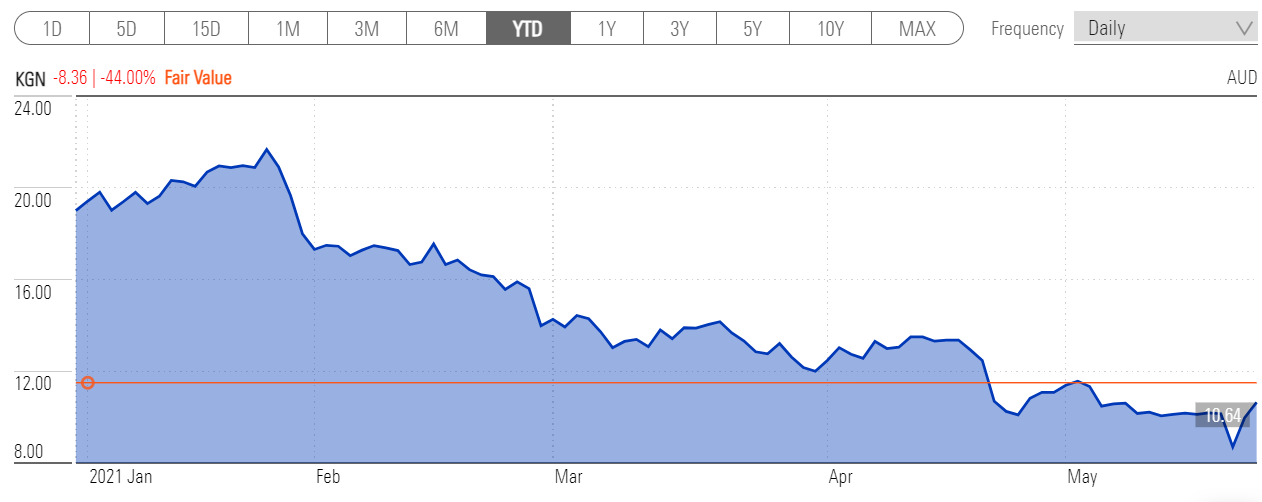Kogan approaches fair value amid glut of stock
The pure-play online retailer’s inventory overload has prompted more promotions and lower gross profit margins, says Morningstar.
Mentioned: Kogan.com Ltd (KGN)
When that supertanker got stuck in the Suez Canal earlier this year, clogging one of the world’s trade arteries, the image of an excavator dwarfed by the gigantic vessel prompted a flood of satirical memes.
In one of them, some wag had photoshopped the word “mindfulness” on to two construction workers surveying the ship and on to the wedged vessel the words: “My anxiety from all the death and COVID.” In another example, more pertinent to Australians, the lone excavator was the spam filter to Kogan.com’s marketing emails.
It seemed an apt analogy for if you’ve ever shopped on Kogan you’ll know they’re persistent product pushers, especially in the past few months.
Why? In short, their efforts to grow the business have led to a glut of stock amid weaker demand. “The online retailer’s high inventory levels have prompted more promotions and lower gross profit margins,” says Morningstar analyst Johannes Faul.

“Kogan had too much stock heading into calendar 2021, resulting in elevated warehousing costs,” Faul said in note this week. “It has been in the process of normalising its stock levels with promotions amid weakening customer demand.”
This campaign has been costly, and Faul had previously expected gross profit margins to recover in the fourth quarter of fiscal 2021.
However, he now expects this promotional campaign to continue into the first half of fiscal 2022.
In late trade on Wednesday, the online retailer was down 6 per cent against broader market gains. The stock price is now half what it was at the start of the year. The no moat stock is now trading in line with Faul’s fair value estimate of $11.50, on a price-to-earnings multiple of 22, and a forward dividend yield of 3 per cent.
Kogan (KGN) YTD

Source: Morningstar Premium; data as of 26 May 2021
Kogan primarily caters to value-driven consumers through its private label products, spanning multiple categories including consumer electronics, furniture, and fitness.
It also sells a range of products from well-known third-party brands such as Apple, Samsung, and Google. And it competes in the online marketplace industry, providing a platform and customer base for approved sellers in exchange for a commission.
In his update, Faul says Kogan’s near-term challenges in grappling with the volatile trading conditions brought upon by the coronavirus have affected fiscal 2021 earnings more than he had expected.
The company has provided adjusted pre-tax earnings guidance of $58 million to $63 million for fiscal 2021.
The midpoint of this guidance range is 26 per cent below Faul’s prior estimate, implying the company will barely break even at the EBITDA level in the fourth quarter.
Despite the weaker guidance, Faul is upbeat about the company’s longer-term prospects and says the online pure-play will benefit from the structural shift in retail transactions to e-commerce.
He expects the growth of the online channel to significantly outperform the traditional brick-and-mortar channel across retailing categories, including consumer electronics.
Morningstar has maintained its earnings forecast beyond fiscal 2022, as well as its $11.50 fair value estimate.
“We downgrade fiscal 2021 EPS by 29 per cent to $0.33 and our fiscal 2022 EPS estimate by 12 per cent to $0.48.
“However, we view the challenges as transitory and our long-term outlook for no-moat Kogan remains unchanged.”
“While the market’s view on Kogan’s longer-term outlook has moderated, we maintain our investment thesis.”
“We forecast Kogan to increase its current gross sales base of over $1 billion at a high-single-digit annual rate over the next decade, broadly in line with the Australian online retail channel and well ahead of the overall retail market at around 4 per cent.”

